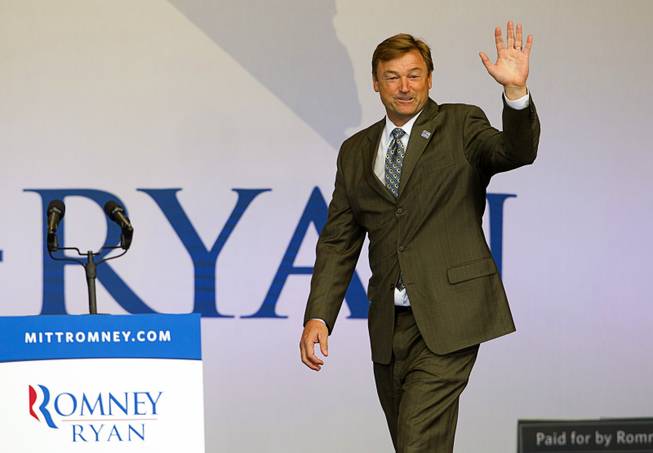
Sen. Dean Heller (R-NV) arrives for a Romney-Ryan campaign rally at the Henderson Pavilion Tuesday, Oct. 23, 2012.
Thursday, Nov. 15, 2012 | 2 a.m.
Sun coverage
After watching their candidates lose the presidency, the 4th Congressional District, and barely eke out a win in the Senate race on Election Day, Nevada Republicans were wringing their hands.
They had scored near-record turnout of their base, particularly in the rural counties, which swing heavily Republican. But they had been decimated at the polls among minority voters, especially Latino voters.
Their strategy of infusing their message to the community with “values” Latinos purportedly share with the Republican Party had fallen short. It was time to talk about the elephant in the room: Immigration. And it was time to find a spokesman to do it.
“I hope Sen. Heller is right there, front and center, when it comes to immigration reform,” said Robert Uithoven, a Republican consultant based in Northern Nevada.
“He should be one of the leading voices on immigration reform ... and I think with a fresh six-year term and the obvious demographic change in Nevada, I think he’d be willing to do it,” Uithoven went on. “I would hope he’d be willing to do it.”
Turns out Dean Heller is not just willing, he’s champing at the bit.
“I want to be a part of this discussion, because getting this issue resolved is in the best interest of everybody,” Heller said Wednesday. “I think we can find ways of solving the problem and make sure that those who are interested in becoming citizens can become citizens.
“Believe me, I have a very open mind on this,” Heller continued. “And I think doing it sooner rather than later is in everybody’s best interest.”
Immigration reform, it appears, is coming up fast as the next major policy topic the new Congress will tackle, after resolving the fiscal cliff.
But the newfound, post-electoral urgency hasn’t necessarily resolved the main sticking point: That Democrats and Republicans just don’t agree on what “comprehensive immigration reform” ought to consist of.
Most lawmakers agree that a resolution to the country’s immigration problems would involve revamping the country’s immigrant visa categories, to make the availability of visas more responsive to the needs of the economy and to help shorten what, in some cases, are near-20 year processing backlogs for certain applicants.
But the parties have been sharply divided on what to do about the immigrants already in the country illegally.
For the bulk of Democrats, a resolution to that situation would be a program that puts undocumented immigrants on a “pathway to citizenship,” one that would be expedited for young undocumented immigrants who came to the country before age 16 and have enrolled in the military or a university
But Republicans have long derided the pathway to citizenship as a form of “amnesty.” During 2012, the GOP’s preferred approach was an enforcement-first outlook that attempted to resolve the undocumented immigration situation through attrition and, as presidential candidate Mitt Romney termed it, “self deportation.”
Post-election, Republican leaders in Nevada were adamant: Such an approach will not work, if the end goal is harmonizing the Republican Party’s relationship with the Latino community.
“We have to regender the party’s policies. And our policy on immigration has just been way too harsh,” a still-dejected Bob List, head of Team Nevada, said two days after the election. “We need to re-think the position we’re taking.”
List may not sound like your average Republican. The former Nevada governor and force behind the Nevada Republicans’ 2012 ground effort calls himself an emphatic fan of the Dream Act, the bill that would put young undocumented immigrants on the pathway to citizenship that most Republicans spent the election deriding as a form of amnesty.
But some elected Republican officials, including Heller, have made a distinct shift to embrace a pro-immigrant position, even if they’re not quite saying outright that they want to disown their former terminology.
“There are provisions in [the Dream Act] that [Sen. Marco] Rubio and myself thought are more open-amnesty,” Heller said Wednesday, reasoning through his position on immigration.
But Heller wanted to be clear: When it comes to a pathway to citizenship, he’s all for it, provided it’s “done right.”
“There should be a pathway, absolutely there should be a pathway: If you served in our military and you’ve done it with distinction, I think you have a right — you’ve proven yourself — to become an American citizen,” Heller said. “I think the same is true with those that are students that are continuing their education, that there should be some kind of a pathway.”
That effectively, is an exact description of the Dream Act that Heller voted against when he was a member of the House two years ago, and a far cry from the rhetoric he employed in 2006, when Heller campaigned on a platform that included ending birthright citizenship, and in his first year in Congress, was quoted in the Reno Gazette-Journal stating bluntly that: “I don’t support amnesty. I don’t support benefits for illegals. I don’t support the Dream Act. I don’t support anchor babies.”
Heller has been moving away from that position throughout his campaign, declaring himself in favor of an “alternative” immigration proposal, potentially the one Rubio, a Republican senator from Florida who is of Cuban descent, was rumored to be writing. But Heller still steered clear of lending his support to the Dream Act, which he equated with amnesty this spring.
Heller’s insistence this week that he supports a pathway to citizenship for military enlistees and students is evidence that he’s further distancing himself from his past positions on immigration.
But so far, nobody, even his harshest critics, is begrudging him the apparent evolution.
“[Heller] didn’t get many votes from the Hispanic community,” said Otto Merida, a Latino Republican who actually endorsed Berkley over Heller because of her position on immigration. “But if he would make this statement, saying this is me reaching out to Hispanics...then this is the moment we can get together.”
“Heller has an opportunity to change the tone that the GOP has taken on immigration,” said Andres Ramirez, a Democratic strategist who is active in the Las Vegas Latino community. “It is smart for Heller, coming from a state with a large immigrant population, to join Obama and Reid in solving the broken immigration system.”
Things haven’t gone quite that far yet. Heller has been meeting chiefly with Rubio, not Reid, to discuss immigration and “try to understand better the particulars and make sure we have a proposal, or at least a seat at the table, when the discussions come up,” Heller said.
But Heller took note of Reid saying immigration was “very, very high on my list” of priorities for the 113th Congress, and said he shares that sense of urgency.
In a way, the fact that Heller and Reid could be close to finding common ground on immigration isn’t surprising.
The issues that involve the Latino population are quickly starting to become those that some lawmakers believe should transcend politics, becoming not partisan issues, but Nevada issues, simply because the population is so large, and growing so fast.
“Both Heller and Reid, they’re in the right positions, both, from the right state, to lead this discussion,” Uithoven said.
Nevada’s population is over a quarter Latino, and in Clark County, the Latinos make up one-third of the population.
It’s a community that’s been increasingly politically active. In every election cycle, Latinos have set records in Nevada for turnout. In 2012, they made up 18 percent of the voting population in Nevada.
But only 24 percent of Latino voters went for Romney, according to exit polls, and only 25 percent went for Heller.
“You can’t lose the fastest-growing demographic group in the United States, 70 to 30 or more, and expect to have long-term success,” said Eric Herzik, a professor of political science at UNR, and himself a registered Republican. “The risky position is not to have some sort of policy of entry into the Latino community.”
Herzik continued to explain the math.
“Heller won his base better than any Republican has won that base before, and he almost lost the election. The base of your party, old white guys, it’s just not a growing group,” Herzik said. “Conservatives might say ‘Oh, if he moves over to the center, we’ll desert him.’ But let’s say you lose 10 percent of the rural vote. OK ... but if he can gain 10 percent of the Latino community, he’s ahead of the game.”
Conservative Hispanics agree, that Heller and Republicans who might follow his lead have nothing to lose by taking a chance on promoting a pro-immigration policy.
“If Heller ... got together with Rubio and some other colleagues in the Senate, including Harry Reid, and put together a bill ... I bet you other Republicans would run to try to get on board with the bill, to get past [their] previous positions,” said Nelson Santiago, a spokesman for Nevada Hispanics, a conservative political action committee.
“The GOP needs to at least try it. They need to reach across the aisle,” Santiago continued. “I don’t think it would hurt Heller one bit.”
Alongside all the progressive talk about pathways to citizenship, Heller is sounding a note of caution to anyone that might expect him to agree with the Democrats 100 percent.
“I talked about this during the campaign, and I said we agree with the community 80 percent of the time,” Heller said. “We do have some disagreements on the particulars, and perhaps the definition of amnesty ... But we’re trying to have an open discussion right now. To date, it’s only been a one-sided discussion and if we can get both sides to start talking and start discussing these issues, I think we can resolve the problem.”
If Heller does decide to reach out, with or without Rubio, it appears Democrats are prepared to catch his grasp.
“Sen. Reid welcomes any openness from Sen. Heller and hopes Sen. Heller brings some of his Republican colleagues on board to pass comprehensive immigration reform,” said Kristen Orthman, a spokeswoman for Reid, on Wednesday night. “He is pleased to see willingness from Republicans to come back to the table, following last week’s elections.”


Join the Discussion:
Check this out for a full explanation of our conversion to the LiveFyre commenting system and instructions on how to sign up for an account.
Full comments policy